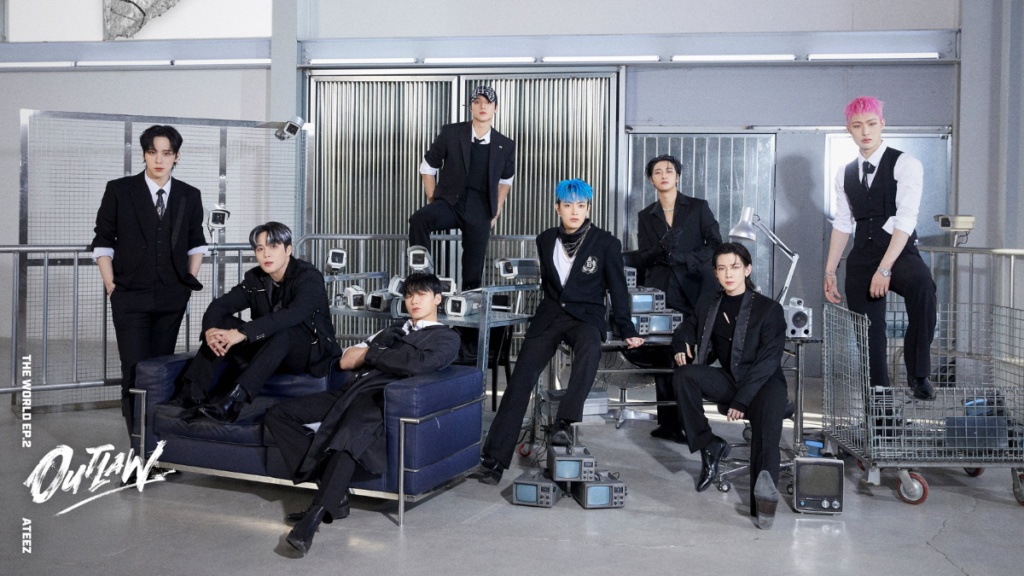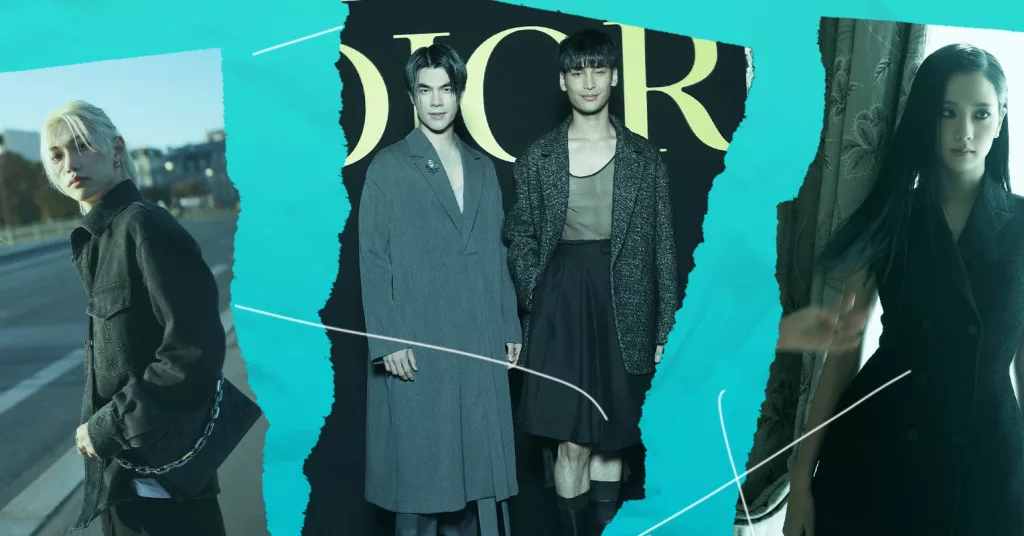Author Spotlight: Ann Liang Wants Readers (and Her Characters) to Enjoy the Journey
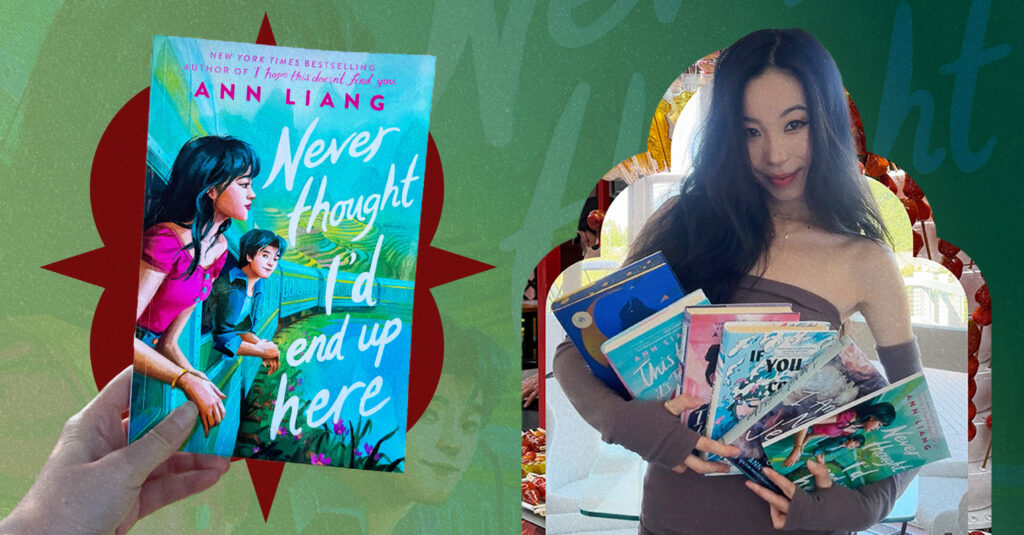
Extraordinary. Beautiful. His source of happiness. This is how Cyrus, the prickly love interest in Never Thought I’d End Up Here by Ann Liang, would describe main character Leah.
Cynical. Unpredictable. Sarcastic. Meanwhile, this is how in-the-midst-of-a-mid-life-crisis Leah would describe Cyrus at the beginning of the young adult romcom.
World, meet Leah and Cyrus, childhood friends turned enemies turned maybe lovers in the novel, which was released today (June 3). Liang’s newest work takes on the travel novel, setting the scene of Leah and Cyrus’ eventual love story in China. Former model Leah doesn’t know who she is anymore. She never considered herself outstanding — her average grades and painfully basic Mandarin skills only prove it — but modeling after her glow-up was something that set her apart. As Leah and Cyrus unexpectedly reconnect on a heritage trip to China, Never Thought I’d End Up Here explores how to unearth your self-confidence again and how love is always there — you just have to find it.
EnVi caught up with the Chinese-Australian author over Zoom to chat about Never Thought I’d End Up Here, why she wanted to set a novel in China, and writing an enemies-to-lovers romance.
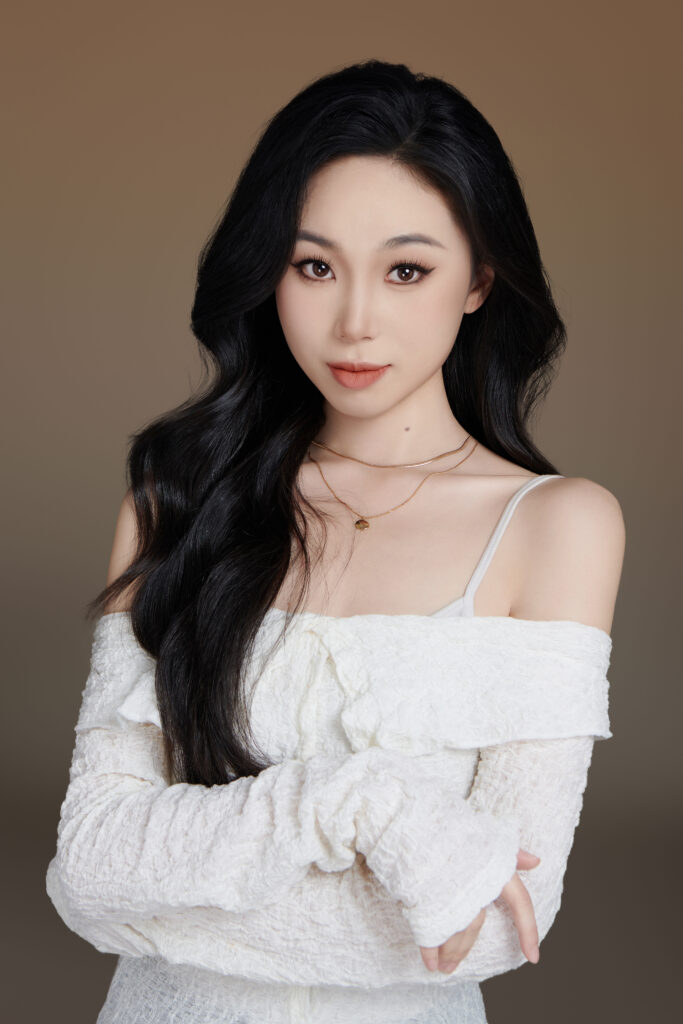
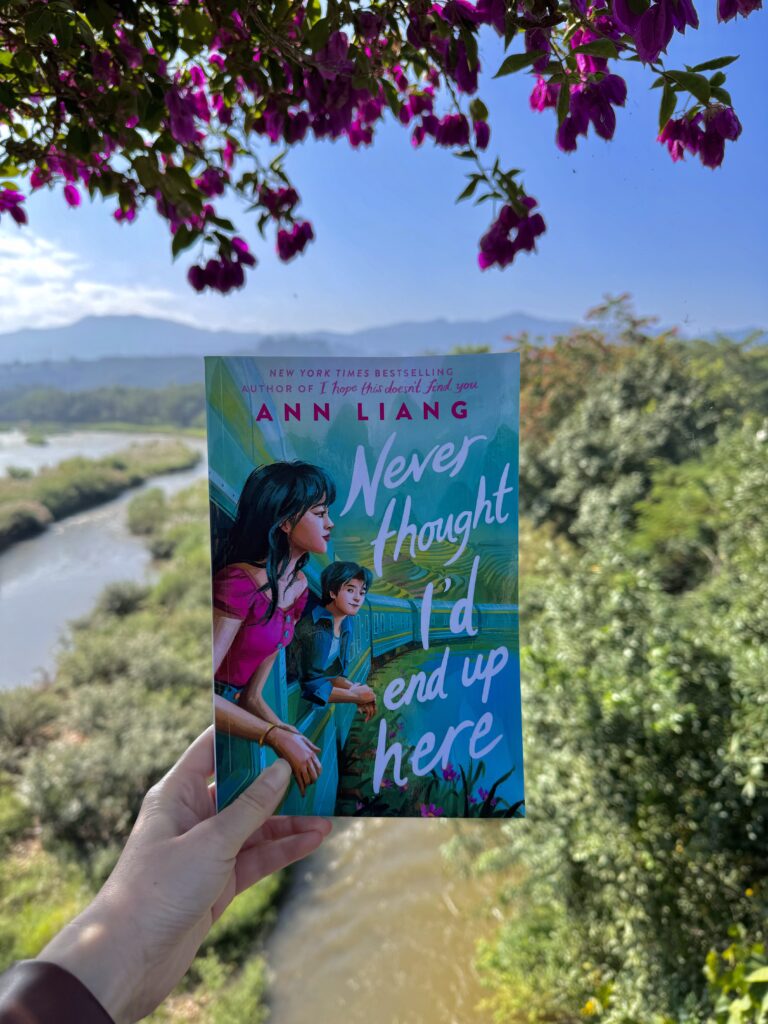
Creating “Emotional Anchors”
Although Cyrus would describe Leah as “extraordinary,” Leah has some different words for herself. She would introduce herself based on her job, that being a model. She would also see nothing else but her mediocrity, including being an average student. Cyrus would also describe Leah as “beautiful,” yet, she “doesn’t feel pretty, even after her big transformation, because she didn’t grow up conventionally attractive,” Liang explained. “Deep down, [Leah] still feels like that very insecure girl,” she noted. As many probably understand on a personal level, those constant messages of what is “beautiful” and what is not tend to follow you.
When Liang started writing Never Thought I’d End Up Here, she knew it would be a travel romcom, but the author didn’t know too much about her main character’s career at that time. One day, during a trip to China, Liang was walking through a national park and it hit her. “I feel like Leah should be a model,” she told EnVi. “It felt very natural; it felt right to her character.” It also made a lot of sense, considering the themes Liang was tackling in her novel: feeling lost and feeling left behind; not knowing who you are; and not knowing what you want.
When readers first meet Leah, she’s untethered, having just quit being a model. Compared to Liang’s other protagonists — including Alice of If You Could See the Sun and Sadie of I Hope This Doesn’t Find You — who have five-year plans, “[Leah] doesn’t even have a five-day plan.” But Liang knew that her newest main character wanted to be a model for the “wrong reasons.” As the author explained, “She thought it would make her seem impressive, and she wants to impress people into loving her.”
Never Thought I’d End Up Here delves into topics revolving around beauty and appearances, especially when you are a young adult still trying to figure out who you are. “There [is] so much scrutiny and there’s so much pressure and all these really unrealistic expectations about looking a certain way,” Liang mused. There’s the pressure of having good style, of being popular, of being “cool.” “I feel like those insecurities were really important for me to dive into,” added Liang.
Leah’s specific insecurities created the “emotional anchor” for her character. By digging deep into these insecurities — “What is something that they really attached to their identity in an unhealthy way?” is a question the author poses throughout her novels — Liang then worked on getting to the root of them. “How do we start to go about breaking that down and making [the characters] realize that there is so much more to their story and their relationships?” In other words, Liang joked, “How do I give them a total existential crisis?”
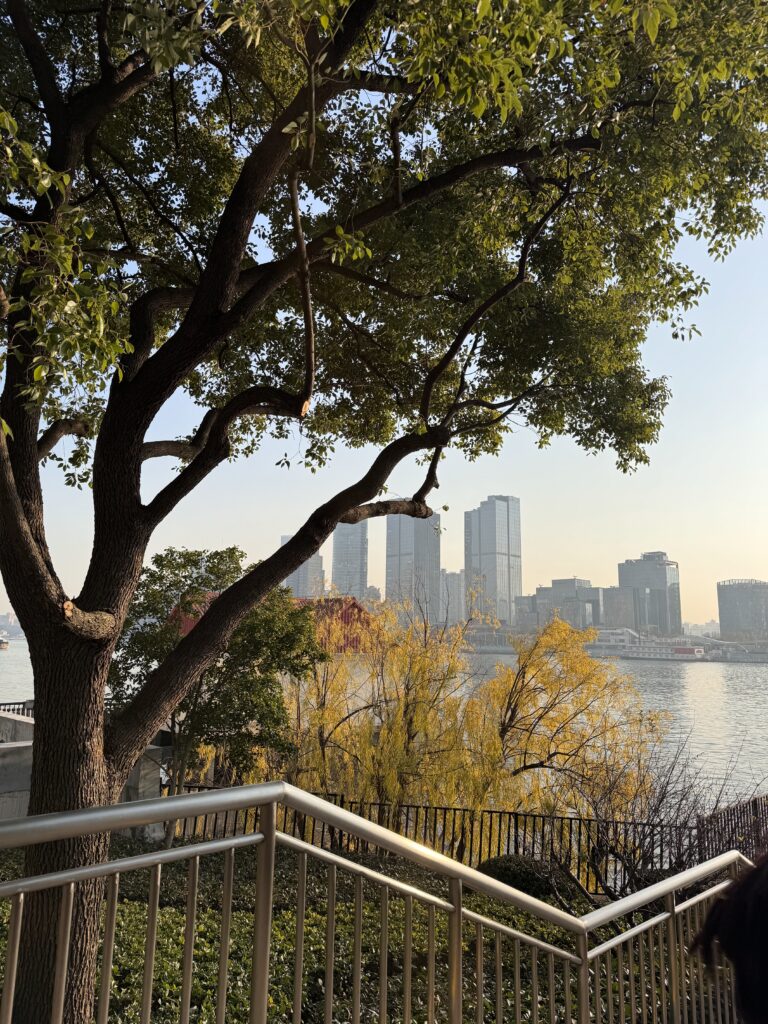

Before Liang could give Leah this existential crisis, Never Thought I’d End Up Here was just an idea. An idea that the author actually came up with at the same time as I Hope This Doesn’t Find You. (At that time, however, both Liang and her publisher Scholastic decided to prioritize the latter novel.) The travel aspect of Never Thought I’d End Up Here was inspired by Liang’s prior trips to China in middle school and high school. Although she went to school in Australia (and Chinese school as well), there was a time when she joined heritage trips and also studied in the country of her family’s roots.
Having more time to work on Leah and Cyrus’ travel romcom allowed Liang to travel to China while drafting. As a result, the story could “simmer” for a little bit between coming up with the idea and actually writing it. “I’ve never written a travel book before, and it was my first time writing a young adult novel set outside of the classroom,” she said. “So that was also really fun and something I wanted to explore.”
“I was going to these cities and I was eating all the food and going sightseeing, taking photos, and strolling through the streets of Shanghai,” Liang said, remembering her research trips to China for her novel. “It was so gorgeous and romantic,” she added, noting that she was “inspired every single day.”
The Contrast Between Enemies-to-Lovers
Love interest Cyrus considers himself to be the three C’s: competent, calm, and composed. While Leah originally saw his self-assuredness as a reminder of her painful lack thereof, once she gets to know him beyond their past mistakes, Leah’s perspective shifts. Cyrus is no longer a cynical, unpredictable, sarcastic person, but rather someone who is gentle, patient, and thoughtful.
Liang pointed out, “[Leah’s] in a place in her life where she really needs that kind of steady presence.” And that’s what Cyrus is to Leah. “Because Leah is so lost, I thought it would be interesting if Cyrus was very much certain about what he wanted out of life,” the author continued.
This “contrast” between Liang’s main characters and their personalities was intentional. “A lot of the chemistry comes from tension,” she said. According to Liang, she added “a lot of things during the revision process,” including more romance scenes — per her editor’s request. Of course, Liang jumped at this opportunity to increase the romantic antics, as it’s “so indulgent for me,” she said with a laugh. Leahcyrus stans, let it be known that one of those scenes was Cyrus’ confession moment. Do what you wish with this information.


What better way to amp up the tension than through an enemy-to-lover dynamic? This romance book trope forms a strong undercurrent in Never Thought I’d End Up Here; however, it posed a challenge for Liang. Cyrus is very clearly Leah’s “enemy” in the beginning of the novel (for good reason, too), but his role as “lover” slowly developed as Liang wrote her drafts. “You want [Cyrus] to be flawed but you also want him to be redeemable,” she emphasized.
To find this fine balance, Liang dug into the stories driving Cyrus’ actions. “Why did he act in this way?” she questioned while writing. “Why does he think in this way? How was he raised? What did he experience?” By knowing more about Cyrus and how his past informs his present self, Leah — and readers — can understand him better.
“Literature helps create a sense of empathy,” Liang stressed. “And it’s what allows us to see things from other people’s perspective[s].”
Shanghai Connections
Never Thought I’d End Up Here isn’t the first novel Liang has set in China. However, If You Could See the Sun and This Time It’s Real were both set in Beijing, where the author was born. In fact, Liang’s “Beijing brand is so strong” (according to her friends) that it was unexpected when she decided to set Leah and Cyrus’ story in Shanghai, despite her mom being from Shanghai.
The southern city became Liang’s choice of setting, since Shanghai was “one of the first cities [she] visited” for her research trips. It “left a very strong impression” on the author, as she brought a different perspective as an adult versus when she was a child visiting with her family. This time around, Liang had the independence to do what she wanted, “a freedom that [she] wanted to explore” in her novel as well.
Discovering independence is a major thread in Leah’s story. The unexpected heritage trip to Shanghai, at first, is just an “escape.” As Liang noted, “[Leah] just wants to get [as] far away from LA and her old life as possible” because she was feeling “stuck in her life and in what people expected of her.” By traveling to China and Shanghai, Leah realized a “new found freedom.”
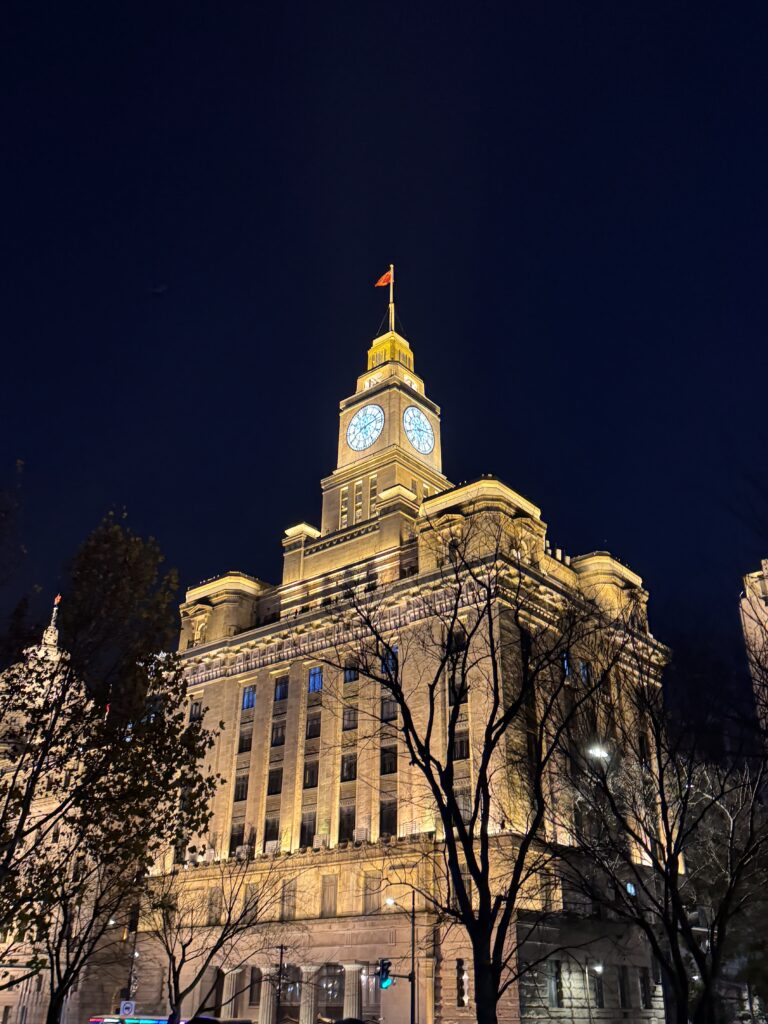

This perspective “[mirrored] my own when I was visiting Shanghai and [could] just be physically immersed in that environment,” Liang shared. She could take a “fresh perspective because it’s from someone who hasn’t been [to Shanghai] before.” Through Leah’s eyes, Liang could “capture as much of the city life and lights at night” and the city’s energy.
As she told EnVi, describing setting is one of her favorite aspects of novel writing. It’s also “one of the things that [she] will very carefully review in later drafts.” While writing these drafts, Liang will ask herself, “Am I doing justice to the feeling? Is this as close as I can get to how it actually felt like to be in this place?” By doing this worldbuilding so carefully, Liang possesses a special power to bring her readers to these places, too.
Reconnecting With Heritage
As a member of the Chinese diaspora, just like Leah, researching and writing Never Thought I’d End Up Here gifted Liang with a “newfound appreciation” for the country of her family’s roots, along with traveling in general. “I remember my first trip back [to China],” she recalled. “I was like, ‘I’ve missed this so much.’” Liang added, “I really felt that homesickness.”
She also had an opportunity to re-introduce herself to China, especially following the height of Covid-19 restrictions. Liang was able to “create new traditions with [her family],” such as trying new restaurants instead of patronizing old haunts or going to different places they had never considered before.
Not only did the author reflect on her knowledge of the country, but she reflected on where she wanted her writing career to go, too. It was an “eye-opening experience for me,” noted Liang. Visiting China, and Shanghai specifically, “helped me to re-shape and reframe some of the things [that] were going on in my own life.” In this way, Liang’s experience connects with Leah’s story of traveling to China and discovering more parts of herself.
“[Traveling] allows you to become a different person, but, on the other hand, I think it uncovers old parts of you.”
There is a “sense [of] reconnection” that you may not get from other experiences.
Learning Mandarin and Crashing Weddings, Oh My!
In addition, the author has her main character confront her insecurity surrounding not knowing Mandarin Chinese — but by the end of the novel, Leah starts to reconnect with her mother language. But, before reaching this point, Liang leans into Leah not knowing. As a result, sometimes when people are speaking in Chinese, there is only the pinyin, with no English translation. “Would translating it into English have the same effect?” Liang probed during our conversation. For example, “心疼” (xīnténg). Literally, it means “your heart…hurts.” But for Leah, she just knows the sound; she doesn’t understand what the phrase means.
As Liang emphasized, “It also lends itself well because it’s about Leah learning Chinese, so it almost makes more sense to have some words in Chinese. She is literally absorbing them, and she is processing them with the readers.”
Before Leah immersed herself in the Chinese language, however, the depth of her wound needed to be exposed. Enter the first chapter of Never Thought I’d End Up Here. It was “probably the scene that I spent the longest [time] thinking about before actually writing it because there’s so much world building that goes on,” admitted Liang. In the first few pages, the author needed to establish who Leah is, her relationship dynamics, as well as her relationship with her cultural identity.
This is where the wedding scene and language mishaps came in. By setting the first chapter during a wedding, Liang could a) include an aspect often found in romcoms and b) increase the stakes of the novel from the get-go. “The stakes are so high [at a wedding] because it’s where you want everything to go perfectly,” she said.
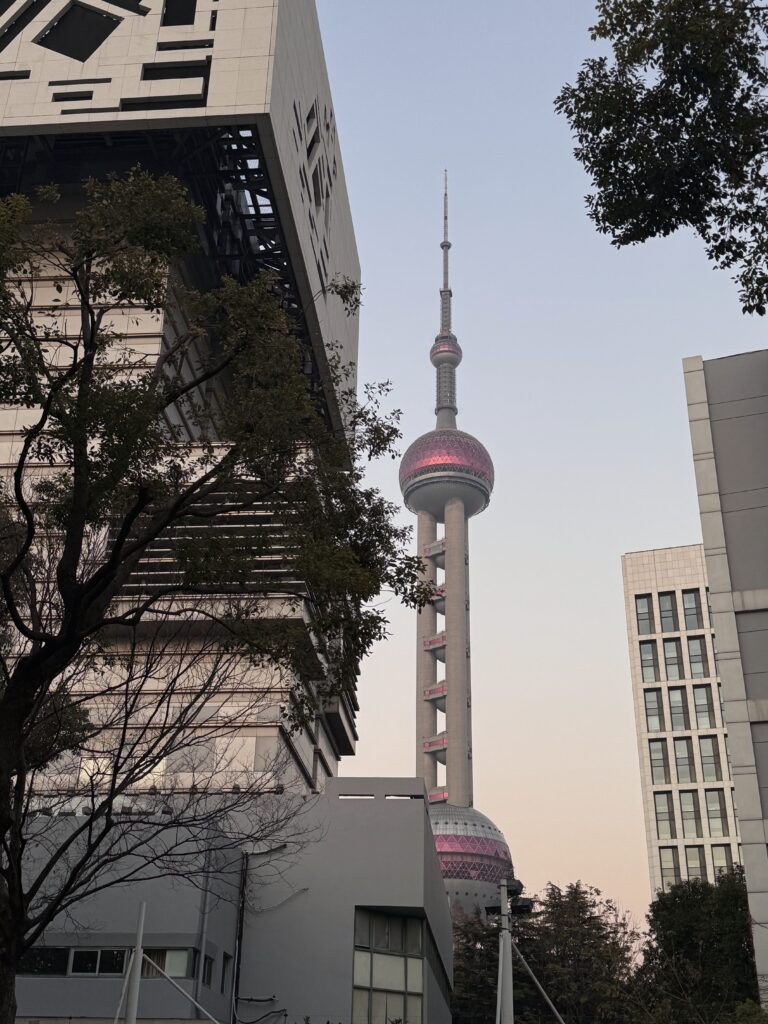

When you want something to go perfectly, it’s the perfect opportunity to reveal the elements really driving your story forward. In the case of Liang with Leah, the author asked herself: “How do I really, really, truly mortify [Leah] within one chapter?” (No spoilers here, but it involves things you definitely should not say to a bride and groom.) Her main character is not only extremely self-conscious in this moment, especially since she had recently quit modeling, and putting up appearances, but she also wanted to give the best first impressions to her extended family. A main piece of this impression is speaking flawless Chinese with her family and inherently understanding the dos and don’ts of important gatherings. If something is done improperly, it won’t just reflect badly on the person doing it wrong but will also reflect badly on the family.
Liang deeply understands the struggles she puts Leah through. Growing up, Liang moved between Australia and China relatively frequently. Yet, “my Chinese was especially bad when I was a teenager,” she reflected. When she wrote her newest novel, Liang “channel[ed] those feelings and similar conversations that I’ve had with my parents.”
The social expectations and etiquette trip up Leah in tandem with her limited language skills. Liang noted that sometimes this expected etiquette is “even more confusing [than not knowing a specific language] because at least with language you could get an actual translator.” When the conversation takes a turn towards bonding over speaking Mandarin, we also shared how we deeply feel Leah’s challenges in that first chapter. As we agreed, it is truly terrifying not knowing what to do at a Chinese family gathering.
Ann Liang (and Her Books) in the U.S.
Luckily, something Liang does not need to feel terrified about is her upcoming book tour in the U.S. From June 1 to June 7, Liang will stop in Virginia, New York, Illinois, Missouri, Georgia, and California.
A special surprise awaits Ann Liang fans who come to her book tour: limited physical editions of “I Hope This Finds You,” a novella from the perspective of I Hope This Doesn’t Find You’s love interest, Julius Gong. “When I first came up with the idea for the novella, it was really just meant to be a fun little bonus,” Liang explained. (For some of her previously released books, she had created a pre-order incentive featuring bonus chapters and other characters).
But then this “little bonus scene” for Never Thought I’d End Up Here’s pre-order campaign turned into a novella-length story. So, Liang reached out to her publisher, not expecting too much. Instead, she was “blown away by how supportive they were.” Liang even asked about having a cover for the new novella, and her publisher got the same cover artist of I Hope This Doesn’t Find You on board. “They put it together so quickly!” she exclaimed.
Despite this, Liang knew “I Hope This Finds You” wasn’t a contracted book, so she couldn’t even begin to hope for physical editions of the novella. Yet, the impossible happened and there will be limited copies she can sign at her book tour stops. They are “a thank you for my readers who are able to come and see me,” she said with a smile.
When we start wrapping up the conversation, EnVi had one last question for Liang: If she could tell Leah and Cyrus something face-to-face before their book is published, what would she say? After a few moments’ pause, Liang said slowly, “One of the main themes of the book is about how you just never know what’s going to happen and that [can] be very scary but you should also embrace it.”
“I hope that they just enjoy and embrace that whole journey,” she added. “And that they’re able to soak in the moment.” Liang continued, wrapping up her thoughts and reflecting on the story she poured her heart into for years, “It’s their week; it’s their time. Their first time out in the world, meeting all of these readers, so I hope they feel the love.”
Never Thought I’d End Up Here is now available wherever books are found. Follow Ann Liang on Instagram, TikTok, and X to keep up with the latest news about her books.
Want to read more conversations with your favorite authors? Check out EnVi’s interview with Aamna Qureshi, who penned The Baby Dragon Cafe, here!
